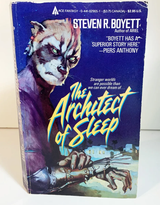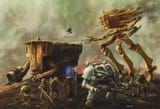>>96142725Because fantasy is about something much much greater and more abstract than "dwarves and elves and swords and magic". The name for *that* genre is "sword-and-sorcery" for a reason. It's technically under the fantasy umbrella because it's not merely "not true" (which is fiction) it's impossible (whether that's because of explicit magic or not is irrelevant for whether it's fantasy or not).
Fantasy is a supergenre for stories which could not take place literally as they are described. Sci-fi is another subgenre of Fantasy, an elder sibling of sword-and-sorcery as we know them today.
Fantasy is, at its core and as a bedrock principle, about asking what if types of questions and working through the answers in the development of the story. What if you could swap lives with someone? What if the universe really did conspire against you, manifesting as skewed probabilities / statistical chance? What if you could eat the souls of the young to sustain your life and vanity? What if you could wave a wand and conjure whatever you wished for?
What might be the consequences if the universe worked differently and what can we learn from those situations to illuminate our own existence? What is human nature and what's it mean to be alive? What do we want and what should we want and why?
That's what fantasy is about. Sword-and-sorcery obliquely engages with / references such questions dressed up as puerile entertainment. You teach children to share and be polite with picture books and cartoons. You teach teenagers how to grow up and respect the sanctity of their lives with sword-and-sorcery. You communicate ideals and consolation about mortality between adults with fantasy.






